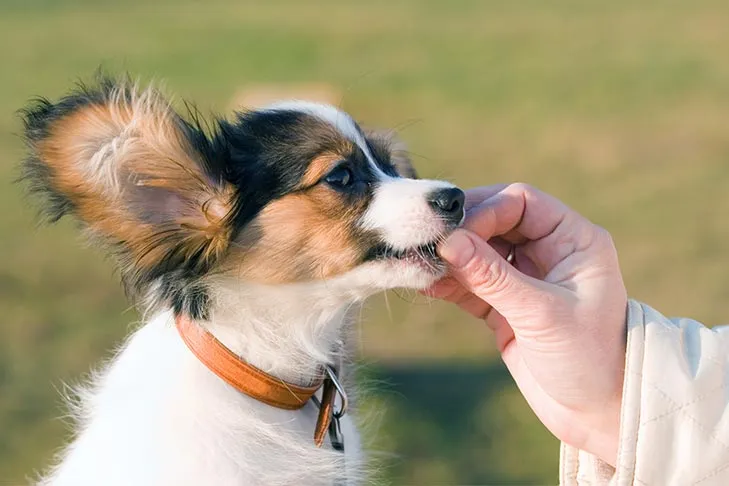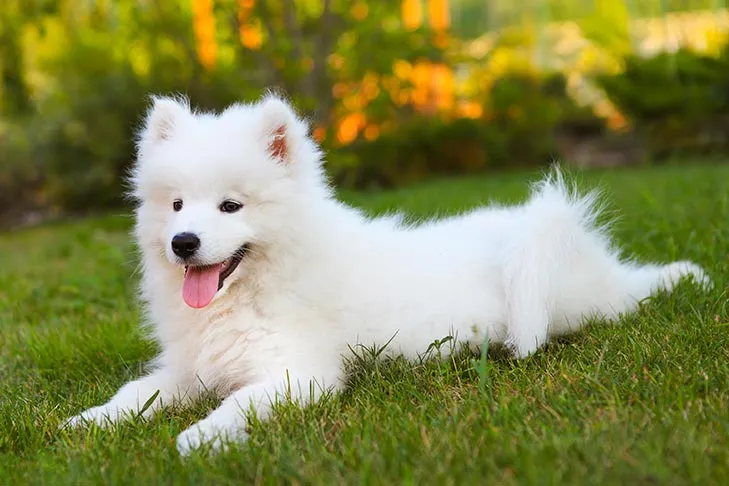Welcoming a new puppy into your home is an exciting time, filled with joy, play, and endless cuddles. As a new pet parent, ensuring your furry friend receives the best nutrition for healthy growth and development is paramount. While commercial puppy food forms the cornerstone of their diet, you might occasionally wonder, “What Type Of Human Food Can Puppies Eat?” Sharing a bite of your meal can feel like a bonding experience, but it’s crucial to understand which human foods are safe, which should be approached with caution, and which are strictly off-limits for your young canine companion. Always remember that any human food should be given in very small quantities and only as an occasional treat, never replacing their specially formulated puppy kibble. For comprehensive guidance on their primary diet, you might want to explore articles like what is the best food you can feed your dog.
Understanding Puppy Dietary Needs
Puppies are not just miniature adult dogs; their nutritional requirements are distinct and demanding. They are in a rapid growth phase, meaning they need more calories, protein, and specific nutrients to support bone, muscle, and organ development. Their digestive systems are also more sensitive and still developing, making them more susceptible to upset stomachs from new or inappropriate foods. Therefore, while certain human foods might be safe for adult dogs, they could pose a risk to a puppy. High-quality puppy food is specifically designed to meet these complex needs, providing a balanced diet essential for their optimal health. Human foods should only ever be considered as very small, occasional treats and never as a primary food source or a substitute for a balanced meal.
Safe & Healthy Human Foods for Your Puppy
When offering human foods to your puppy, always follow general guidelines: ensure the food is cooked, plain (without seasonings, salt, sugar, or butter), and served in very small, manageable portions to prevent choking. Always remove any bones, seeds, or pits.
Cooked Eggs
Eggs are an excellent source of protein, essential fatty acids, and vitamins for puppies. If your puppy has an upset stomach, a small amount of plain, scrambled, or boiled egg can be soothing. Ensure eggs are fully cooked to eliminate the risk of salmonella and to avoid biotin deficiency, which can be caused by raw egg whites.
Lean, Cooked Meats
Plain, cooked chicken or turkey (without skin or bones) can be a fantastic source of lean protein for your puppy. Always make sure the meat is unseasoned, thoroughly cooked, and cut into tiny, bite-sized pieces to prevent choking. Avoid fatty trimmings as they can upset a puppy’s delicate digestive system.
Certain Fish
Fully cooked salmon and sardines offer beneficial omega-3 fatty acids, which support brain development and joint health in growing puppies. For salmon, ensure it’s cooked through and all bones are meticulously removed. Sardines can be given in very small quantities, as their bones are soft and digestible, providing extra calcium. Always limit fish intake to small, occasional treats and never feed raw or undercooked fish, which can contain dangerous parasites that are particularly harmful to puppies.
Healthy Vegetables
Many vegetables are safe and beneficial for puppies when prepared correctly.
- Carrots: Raw or cooked, carrots are a great source of vitamins and fiber, and chewing on raw carrot sticks can help with teething. Cut them into appropriate sizes to prevent choking.
- Green Beans: Plain, cooked, or raw green beans are low in calories and high in vitamins and fiber.
- Sweet Potatoes: Cooked and mashed or cut into small pieces, sweet potatoes are rich in vitamins, fiber, and carbohydrates, making them a nutritious treat.
Specific Fruits
Fruits can offer vitamins and antioxidants, but always in moderation due to their sugar content. Remove all seeds, pits, and cores.
- Apples: Sliced apples (without seeds or core, which contain cyanide) provide fiber and vitamins.
- Blueberries: These tiny superfoods are packed with antioxidants. Offer a few at a time.
- Bananas: Small slices of banana offer potassium and vitamins, but are also high in sugar, so give sparingly.
Plain Yogurt
A tiny dollop of plain, unsweetened yogurt can be given to puppies if they are not lactose intolerant. The active bacteria (probiotics) can aid digestion. Crucially, avoid any yogurts with added sugars or artificial sweeteners, especially xylitol, which is highly toxic to dogs.
Unsalted Peanut Butter
Raw, unsalted peanut butter can be a good source of protein and healthy fats. However, it’s very important to check the label for xylitol, a common sugar substitute that is extremely poisonous to dogs. Even small amounts of xylitol can be fatal to puppies. Due to its high fat content, give only a very small lick as an occasional treat.
Low-Fat Cheese
Small, infrequent amounts of low-fat cheese, like cottage cheese or mozzarella, can be a tasty treat. While rare, some puppies can be lactose intolerant, so introduce it cautiously and observe for any digestive upset. Due to its fat content, moderation is key to prevent weight gain.
 A cute Papillon puppy gently taking a treat from a human hand, focusing intently on the reward.
A cute Papillon puppy gently taking a treat from a human hand, focusing intently on the reward.
Human Foods to Approach with Caution for Puppies
Some human foods, while generally safe for adult dogs in strict moderation, require even greater caution or are best avoided for puppies due to their developing systems or potential risks.
Bread
Small amounts of plain, unseasoned bread won’t cause immediate harm, but it offers no nutritional benefits for a puppy. It’s high in carbohydrates and calories and can easily lead to weight gain. It’s generally best to avoid bread for puppies, especially store-bought varieties that may contain preservatives.
Cashews and Peanuts
These nuts contain beneficial nutrients but are high in fat. Only offer a very few unsalted cashews or peanuts as an occasional treat. For puppies, there’s also a choking hazard, so ensure they are broken into very small pieces. Too much fat can lead to gastrointestinal upset or even pancreatitis in sensitive puppies.
Corn (Off the Cob)
While corn is a common ingredient in many dog foods, the cob itself is a serious choking hazard and can cause intestinal blockages, which are particularly dangerous for smaller puppies. If you share corn, ensure it is completely off the cob and given in tiny amounts.
Honey
Honey contains various nutrients and can sometimes be used to help with seasonal allergies by introducing small amounts of pollen. However, honey is also high in sugar. For puppies, give only a minuscule amount very infrequently, and never if they are under 8 weeks old, due to potential botulism spores, though this is rare.
Milk
Many puppies are lactose intolerant, and milk can cause digestive upset like diarrhea. While a tiny amount might be okay for some, it’s generally best to avoid giving milk to puppies and stick to water for hydration. Puppy-specific milk replacers are formulated for young pups that need supplementary liquid nutrition.
Pork
Pork can be a highly digestible protein, but it is also high in fat. If offering pork, ensure it is lean, thoroughly cooked, unseasoned, and given in very small, infrequent portions. Avoid all bones and fatty trimmings.
Quinoa, Wheat, or Grains
These ingredients are often found in high-quality puppy foods and can be good sources of protein, fatty acids, and fiber. However, if your puppy has allergies or sensitivities, introducing new grains should be done with extreme caution and ideally under veterinary guidance. As an occasional treat, small amounts of cooked, plain quinoa can be offered.
Human Foods Puppies Must NEVER Eat
Some human foods are outright toxic and must be kept completely away from your puppy. Ingesting even small amounts can lead to severe illness or be fatal. For a more comprehensive list of forbidden foods, consult what dogs shouldn t eat list.
- Chocolate: Contains theobromine, which is toxic to dogs.
- Grapes and Raisins: Can cause kidney failure.
- Xylitol: A sugar substitute found in many sugar-free products (gum, candies, peanut butter) that causes a rapid insulin release and liver failure.
- Onions, Garlic, Chives: Belong to the Allium family and can cause red blood cell damage.
- Avocado: Contains persin, which can cause vomiting and diarrhea.
- Alcohol: Extremely toxic, even in small amounts.
- Caffeine: Found in coffee, tea, and energy drinks, it can be fatal.
- Macadamia Nuts: Can cause weakness, vomiting, tremors, and hyperthermia.
- Raw/Undercooked Meats, Eggs, Fish: Risk of bacterial contamination (e.g., Salmonella, E. coli) and parasites. For details on which meats to avoid, refer to what meat should i not feed my dog.
- Salty Snacks: High sodium intake can lead to excessive thirst, urination, and even sodium ion poisoning.
- Fat Trimmings and Bones (cooked or raw): Fatty trimmings can cause pancreatitis. Bones, especially cooked ones, can splinter and cause choking or internal damage.
- Yeast Dough: Can cause painful gas and bloating, and if ingested, the yeast can produce alcohol.
- Nutmeg: Can cause hallucinations, tremors, and seizures.
 A Samoyed puppy laying comfortably in the green grass outdoors on a sunny day.
A Samoyed puppy laying comfortably in the green grass outdoors on a sunny day.
Tips for Introducing New Human Foods to Your Puppy
Introducing human foods to your puppy should always be done with caution and mindfulness. Start with very small amounts, typically a pea-sized portion, to see how your puppy reacts. Introduce only one new food at a time, allowing a few days between new additions. This helps you identify if a particular food causes any adverse reactions, such as vomiting, diarrhea, lethargy, or allergic symptoms like itching or swelling. Always monitor your puppy closely after feeding them a new treat. If you notice any concerning symptoms, stop feeding that food immediately and consult your veterinarian. When in doubt, it’s always best to err on the side of caution and consult your vet before introducing any new human food, especially considering the specific needs of young pups. For more information tailored to very young puppies, consider reading what human food can a 6 week old puppy eat.
 An All American Dog resting its head on a kitchen table, looking intently at a block of cheese.
An All American Dog resting its head on a kitchen table, looking intently at a block of cheese.
Conclusion
Understanding what type of human food can puppies eat safely is a vital part of responsible pet ownership. While a high-quality puppy food should always be their primary source of nutrition, offering small, safe, and appropriate human food treats can be a way to add variety and enhance your bond. Always prioritize your puppy’s health by selecting plain, cooked, unseasoned options and giving them in strict moderation. Familiarize yourself thoroughly with the list of foods toxic to puppies and ensure they are never within reach. When in doubt about any food, or if your puppy shows any signs of distress after eating something new, always consult your veterinarian immediately. Your vet is the best resource for personalized dietary advice tailored to your puppy’s specific needs and health status. For more insights into safe human foods for dogs of all ages, you can explore what human foods can dogs safely eat.
